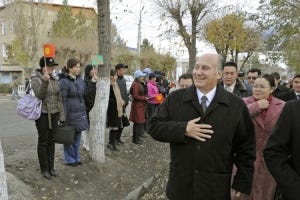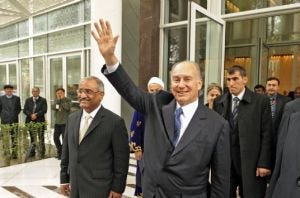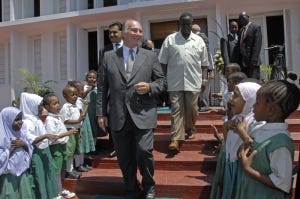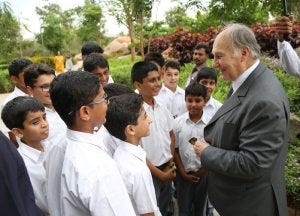Aga Khan Development Network: The “Mahdi-ist” Mission of the Ismaili Imamat
To the Imamat, the meaning of “quality of life” extends to the entire ethical and social context in which people live, and not only to their material well-being measured over generation after generation. Consequently, the Imamat’s is a holistic vision of development, as is prescribed by the faith of Islam. It is about investing in people, in their pluralism, in their intellectual pursuit, and search for new and useful knowledge, just as much as in material resources. But it is also about investing with a social conscience inspired by the ethics of Islam. It is work that benefits all, regardless of gender, ethnicity, religion, nationality or background. Does the Holy Qur’an not say in one of the most inspiring references to mankind, that Allah has created all mankind from one soul? Today, this vision is implemented by institutions of the Aga Khan Development Network.
Imam Shah Karim al-Husayni Aga Khan IV,
(Alltex EPX Limited Opening Ceremony, Kenya, December 19, 2003: Read Here)
The Aga Khan Development Network (AKDN) is a group of development agencies established by the contemporary Ismaili Imamat over the last 100 years; the Network operates in over 35 countries, employs over 80,000 people and 100,000 volunteers, and spends over $600 million dollars annually to raise the quality of life of all people in need, regardless of faith, culture or ethnicity. The AKDN accomplishes this through numerous activities in poverty relief, healthcare, economics, education, health services, architecture, agriculture, cultural restoration, tourism, etc. The roots of the AKDN go back to the first Khoja Ismaili school established by Imam Aga Ali Shah Aga Khan II in Bombay and the first Aga Khan Schools created in Zanzibar by Imam Sultan Muhammad Shah Aga Khan III. As explained by Imam Shah Karim al-Husayni Aga Khan IV, the work of AKDN is not mere philanthropy – because philanthropy is voluntary, as a choice. On the contrary, the AKDN’s work is a sacred obligation of the Ismaili Imams based on the very definition of their Imamat stemming directly from the ethics of Islam:
I am fascinated and somewhat frustrated when representatives of the Western world — especially the Western media — try to describe the work of our Aga Khan Development Network in fields like education, health, the economy, media, and the building of social infrastructure. Reflecting a certain historical tendency of the West to separate the secular from the religious, they often describe it either as philanthropy or entrepreneurship. What is not understood is that this work is for us a part of our institutional responsibility — it flows from the mandate of the office of Imam to improve the quality of worldly life for the concerned communities.
– Imam Shah Karim al-Husayni Aga Khan IV,Acceptance Address, Tutzing Evangelical Academy’s Tolerance Award, May 20, 2006: Read Here)
The below diagram illustrates how all of the AKDN’s agencies – such as the Aga Khan Foundation, Aga Khan University, Aga Khan Trust for Culture, Aga Khan Academies, and Aga Khan Fund for Economic Development – are enactments and translations of Islamic ethics into institutional action.

The ethics of Islam enjoin all believers, individually or through institutions such as the Ismaili Imamat, to assist the poor, the isolated, and the marginalised to improve their current circumstances and future prospects. Through the Imamat, I have tried to respond to this responsibility by creating a group of private, non-denominational agencies the Aga Khan Development Network – to respond to the needs and potential of people living in some of the poorest parts of the world, irrespective of their gender, ethnicity, or religion.
– Imam Shah Karim al-Husayni Aga Khan IV,
(World Mountain Forum UNESCO, Paris, France, June 5, 2000)
The foundations of the Ismaili Imamat’s work being accomplished today through the Aga Khan Development Network were established and prophecised 1400 years ago. Numerous reports (ahadith) of the Prophet Muhammad in both Sunni and Shi‘a collections describe how one of Prophet Muhammad’s direct descendants would establish justice in the world and rid the earth of all injustice, oppression and poverty. The Prophet Muhammad refers to his future descendant, in the line of Imam ‘Ali ibn Abi Talib and Hazrat Fatimah (the Prophet’s daughter), as a member of his Ahl al-Bayt and describes him as follows:
If only one day of this world remained, God would raise up a man from my Ahl al-Bayt who would fill the earth with justice as it has been filled with oppression.
– Prophet Muhammad,
(Sunan Abu Dawud, Book 37, Hadith No. 4270: http://sunnah.com/abudawud/38/5)
If only one day of this world remained. God would lengthen that day, until He raised up in it a man who belongs to me or to my Ahl al-Bayt whose father’s name is the same as my father, who will fill the earth with equity and justice as it has been filled with oppression and tyranny.
– Prophet Muhammad,
(Sunan Abu Dawud, Book 37, Hadith 4269: http://sunnah.com/abudawud/38/4)
The Mahdi is from me and he will have a broad forehead and a prominent nose. He will fill the earth with equity and justice as it was filled with oppression and tyranny and he will rule for seven years.
– Prophet Muhammad,
(Sunan Abu Dawud, Book 37, Hadith 4272: http://sunnah.com/abudawud/38/7)
The Mahdi will be one of the descendants of Fatimah.
– Prophet Muhammad,
(Sunan Ibn Majah, Book 36, Hadith 4086: http://sunnah.com/ibnmajah/36/161)
The Mahdi is among us, the Ahl al-Bayt. God will rectify him in a single night.
– Prophet Muhammad,
(Sunan Ibn Majah, Book 36, Hadith 4085: http://sunnah.com/ibnmajah/36/160)
The people of my Ahl al-Bayt will face calamity, expulsion and exile after I am gone, until some people will come from the east carrying black banners. They will ask for something good but will not be given it. Then they will fight and will be victorious, then they will be given what they wanted, but they will not accept it and will give leadership to a man from my Ahl al-Bayt. Then they will fill it with justice just as it was filled with injustice. Whoever among you lives to see that, let him go to them even if he has to crawl over snow.
– Prophet Muhammad,
(Sunan Ibn Majah, Book 36, Hadith 157: http://sunnah.com/ibnmajah/36/157)
The Mahdi will be among my community. If he lives for a short period, it will be seven, and if he lives for a long period, it will be nine, during which my nation will enjoy a time of ease such as it has never enjoyed. The land will bring forth its yield and will not hold back anything, and wealth at that time will be piled up. A man will stand up and say: “O Mahdi, give me!” He will say: “Take.”
– Prophet Muhammad,
(Sunan Ibn Majah, Book 36, Hadith 158: http://sunnah.com/ibnmajah/36/158)
At the end of the time of my community, the Mahdi will appear. God will grant him rain, the earth will bring forth its fruits, he will give a lot of money, cattle will increase and the community will become great.
– Prophet Muhammad,
(Al-Hakim al-Naysaburi, al-Mustadrak ‘ala al-Sahihayn, 4:557-558, No. 8669)
The promised descendant of the Prophet Muhammad who brings justice to the world and relieves it of oppression and injustice is called al-Mahdi, meaning, “the one rightly guided by God.” Sunni Muslims, Twelver Shi‘as and many Sufis expect this descendant of the Prophet, al-Mahdi, to be a single messianic person who appears in the future shortly before the Day of Judgment and who relieves the entire world of injustice and brings relief to humankind in just a few years (or just one night per some traditions). Meanwhile, the Shi‘a Ismaili Imams and Ismaili Muslim thinkers have explained that al-Mahdi is not a single person but actually a function undertaken by some of the hereditary Shi‘a Ismaili Imams from the progeny of Prophet Muhammad and Imam ‘Ali ibn Abi Talib. Throughout history, only a certain number of Imams have had the practical means to undertake such a grand mission of establishing justice and equity and removing oppression and injustice from the world because most of the Ismaili Imams have been heavily persecuted. For example, the founder of the Fatimid Caliphate, Imam ‘Abdullah al-Mahdi, and the Fatimid-Imam Caliphs each performed the function or mission of the Mahdi. The Mahdi is therefore a mission carried out by several Shi‘a Ismaili Imams and not a specific individual.
Qadi al Nu‘man reports from the Imam al-Mu‘izz that a certain man came to the first Fatimid Imam-Caliph al-Mahdi bi’llah and asked: “Are you really the expected Mahdi, under whose authority God shall gather His servants, making him the king of the earth, and shall the religion of the world become one under you?”
The Imam al-Mahdi replied: “The mission of the Mahdi is enormous. I have a considerable share in it, and those who are coming after me shall also share it.”
The Imam al-Mu‘izz added: “If it [the mission of the Mahdi] should be the lot of one person only, how could anything from it come to me. [The Imam-Caliph] al-Mahdi was the key which opened the lock of the Divine bounty, mercy, blessing, and happiness. By him God has opened all these to His servants. And this shall continue after him in his successors, until the promise of God which He made to them in His bounty, might, and power, will be fulfilled.”
(Sayyidna Abu Hanifah al-Nu‘man, Sharh al-Akhbar, tr. Wladimir Ivanow, Ismaili Tradition Concerning the Rise of the Fatimids, 102-103)
Thus, the Ismaili Imams who ruled as Fatimid Caliphs applied the term Mahdi and Mahdiyyun to their entire dynasty of Imams. Throughout the public sermons (khutbahs) of the Fatimid Imam-Caliphs, they always refer to themselves as the “Mahdi-ist” (al-mahdiyyun) Imams and Caliphs. The term Mahdi therefore applies to multiple Ismaili Imams instead of just one individual. Every Ismaili Imam who has the capacity to carry out the mission of establishing justice and spreading compassion in the world at large is called al-Mahdi because he performs the Mahdi-ist mission.
Al-Mahdī or its plural al-mahdiyyūn, moreover, was, to judge from the khuṭbas and other surviving documents, the standard way these early Fatimids referred to themselves. The phrase khulafāʾ al-rāshidīn al-mahdiyyīn, ‘the rightly guided mahdī-ist caliphs’, was a part of the very first Fatimid khuṭba. Al-Qāʾim in 302 asked for God’s blessings on al-khulafāʾ al-rāshidīn al-mahdiyyīn. In al-Manṣūr’s first khuṭba he uses the words ibn al-mahdiyyīn ‘son of the mahdīs’ for his grandfather. Later in the same sermon he cites al-hudāt al-mahdiyyīn, ‘the rightly guided guides’. In a subsequent khuṭba he speaks of al-Mahdī as wārith faḍl al-aʾimma al-mahdiyyīn min ābāʾihi al-khulafāʾ al-rāshidīn, ‘the inheritor of the excellence of the Mahdī-ist imams from his forefathers, the rightly guided caliphs’. In the same sermon he calls al-Mahdī ‘the distinguished offspring of the rightly guided imams’ (najīb al-aʾimma al-mahdiyyīn). The phrase al-aʾimma al-mahdiyyīn becomes standard in subsequent khuṭbas. And it appears regularly in many contexts—documents and khuṭbas — throughout the Fatimid period.
– Paul E. Walker, (Orations of the Fatimid Caliphs, Chapter 2, 70-71)
Today, the 49th hereditary Ismaili Imam, Shah Karim al-Husayni Aga Khan IV, is undertaking the “Mahdi-ist” mission – the functions of the Mahdi – through the work of his institutions in the Aga Khan Development Network. In fact, the hadith describing the mission of the Mahdi is very much mirrored in the Aga Khan Development Network mission statement as stated in the AKDN Ethical Framework as follows:

The Aga Khan Development Network is a contemporary endeavor of the Ismaili Imamat to realise the social conscience of Islam through institutional action. It brings together, under one coherent aegis, institutions and programmes whose combined mandate is to help relieve society of ignorance, disease and deprivation without regards to the faiths or national origins of people whom they serve.
(The Aga Khan Development Network Mandate in the AKDN Ethical Framework: http://www.akdn.org/publications/akdn_ethical_framework.pdf)
If only one day of this world remained. God would lengthen that day, until He raised up in it a man who belongs to me or to my Ahl al-Bayt whose father’s name is the same as my father, who will fill the earth with equity and justice as it has been filled with oppression and tyranny.
– Prophet Muhammad,
(Sunan Abu Dawud, Book 37, Hadith 4269: http://sunnah.com/abudawud/38/4)
This is the impulse that drives the Aga Khan Development Network, the AKDN. To understand this dimension of the religious office I hold, one must appreciate that Islam encompasses both the spiritual and the secular. This unity underpins an unrelenting effort towards an equitable order, where the vulnerable are helped to regain the dignity of self-fulfillment.
– Imam Shah Karim al-Husayni Aga Khan IV,
(Acceptance Address, Die Quadriga 2005 Prize, October 3, 2005: Read Here)
Some Sunni hadiths state that the father of the promised Mahdi will have the same name as the Prophet Muhammad’s own father. It is worth noting that the most prominent forefather or “father” of Prophet Muhammad according to the Qur’an is Hazrat Isma‘il son of Prophet Abraham. The meaning of the phrase in the hadiths, that the Mahdi’s “father” will have the same name as the Prophet’s “father”, is that the Imams who carry out the mission of the Mahdi will be especially known by and named after their “father” or ancestor with the same name as the Prophet’s forefather, Isma‘il. And this is precisely the case today: the true Imams who fulfill Prophet’s prediction and carry out the mission of the Mahdi are the Ismaili Imams; they publicly trace their lineage to the Prophet through Isma‘il son of Ja‘far al-Sadiq in the same way Prophet Muhammad publicly traced his own descent from Prophet Ibrahim through Isma‘il son of Abraham.

Interviewer: And your own descent as head of the Isma‘ilis is from…?
Aga Khan IV: Is from Isma‘il.
Interviewer: And where do you rank?
Aga Khan IV: I am the forty-ninth.
Interviewer: You are the forty-ninth Imam?
Aga Khan IV: Yes, Yes.(BBC Radio 4 Interview with Michael Charlton, September 6, 1979: Read Here)
In conclusion, Imam Shah Karim al-Husayni Aga Khan IV, as the founder of the Aga Khan Development Network, is today fulfilling the mission of the promised Mahdi foretold 1400 years ago by his own ancestor, Prophet Muhammad. Even though the Ismaili Imams endured great persecution over the last thousand years, the period of persecution has passed and the Imams, as per the Prophet’s own promise, are now engaged in bringing justice and equity to the world through the Aga Khan Development Network. Below is a list of some of the AKDN’s accomplishments to this end, followed by a special AKDN video describing them:

• AKDN has been improving the quality of life of millions of human beings for over 100 years;
• AKDN operates in over 35 countries, employs 80,000 people and mobilizes over 100,000 volunteers worldwide;
• AKDN’s annual budget is over $925 million and funded in large part by Imam Shah Karim al-Husayni Aga Khan IV;
• AKFED (Aga Khan Fund for Economic Development) generates $3.5 billion in annual revenue and all profits are reinvested for development;
AKDN raised $1 billion from its own resources and partners for social, economic and cultural development in Afghanistan;
• AKDN through the Aga Khan Trust For Culture (AKTC) has executed 8 projects to restore or create parks, historic sites and gardens – which attract 5 million people every year and 43 million visitors since opening;

• AKDN has created 5 power plants providing electric power to 10 million people in Asia and Africa;

• AKDN runs over 200 health centres, hospitals, clinics and community health programs, allowing over 5 million people to obtain healthcare every year;

• AKDN has helped 8 million people achieve greater food security and high income through agricultural and disaster preparedness projects;
• AKDN has plants over 1 million trees every year; 134 million trees have been planted in Asia and Africa;

• AKDN provides 17 million people in Asia and Africa access to financial services through various financial initiatives including micro-finance;
• AKDN has established and runs 200 schools (including IB schools) and 2 universities (AKU, UCA) with campuses in 9 countries – helping educate 2 million students per year;

• AKDN supports 40,000 civil society organizations with a membership of over 1.3 million people;
• AKA (Aga Khan Award for Architecture) gives $1 million in prize money for every award cycle and has a database of 9,000 architectural projects;
• AKDN provides 1.3 million people with safe drinking water, sanitation and sewage facilities;
Appendix: How the present Ismaili Imam defines the mission of the Aga Khan Development Network
(Courtesy of NanoWisdoms Archive “Search” Feature)
In Islam, the Holy Quran offers explicit direction to share resources beyond one’s requirements, and to care for the poor and those in need. The injunction to service is the ethical underpinning of the work of the Aga Khan Development Network. It drives its efforts to build the intellectual capital and institutions needed to address the problems of our world today. An example is the Global Centre for Pluralism which we have recently founded in partnership with the Government of Canada. The achievements of the AKDN would not be possible without the tireless contributions of the global community of Ismailis that I lead, residing in Central and Southern Asia, the Middle East, Africa, Europe and North America. Our volunteers and contributors also include many thousands of others from multiple cultures and faiths around the world. They are united with us in our mission to help build capacity and dignity for individuals, to enable them to take control of their own development.
(Acceptance Remarks upon Receiving the Carnegie Medal for Philanthropy, October 4, 2005: http://www.nanowisdoms.org/nwblog/7173/)
I think that the nature of the office of the Imam, whether it’s a Shia imam or a Sunni imam, is to have the capacity to achieve results. When my grandfather died in 1957, the Ismaili Imamat did not have the vehicles in the structured manner that it has today to act in these various fields internationally. Today it has that capacity. It is a very big network. It’s grown obviously over the years and it’s been driven by recognition of need as time has gone by.
(NBC Interview, Richard Engel, December 31, 2010: http://www.nanowisdoms.org/nwblog/9644/)
As spiritual leader of Ismailis, I have a responsibility to improve the quality of life of our community members, and all who share their lives. The Aga Khan Development Network, or AKDN, work in this direction.
(Le Parsien Interview, Gilles Maarek, June 17, 2002: http://www.nanowisdoms.org/nwblog/10073/)
I am fascinated and somewhat frustrated when representatives of the Western world — especially the Western media — try to describe the work of our Aga Khan Development Network in fields like education, health, the economy, media, and the building of social infrastructure. Reflecting a certain historical tendency of the West to separate the secular from the religious, they often describe it either as philanthropy or entrepreneurship. What is not understood is that this work is for us a part of our institutional responsibility — it flows from the mandate of the office of Imam to improve the quality of worldly life for the concerned communities.
(Acceptance Address, Tutzing Evangelical Academy’s Tolerance Award, May 20, 2006: http://www.nanowisdoms.org/nwblog/7706/)
In Islam, the Holy Qur’an offers explicit direction to share resources beyond one’s requirements, and to care for the poor and those in need. The injunction to service is the ethical underpinning of the work of the Aga Khan Development Network. It drives its efforts to build the intellectual capital and institutions needed to address the problems of our world today.
(Acceptance Address, Carnegie Medal for Philanthropy, October 4, 2005: http://www.nanowisdoms.org/nwblog/7543/)
The Aga Khan Development Network has a goal. The goal is to try to make the countries where we work, countries of opportunity for their populations. That is the goal. What can we do to make each one of these countries a place of a happy and secure future.
(Acceptance Remarks, University of California San Franciso Medal, April 26, 2011: http://www.nanowisdoms.org/nwblog/9897/)
I am fortunate to lead an international community with a strong social conscience. Bridging North and South, East and West, the Ismailis have a long tradition of philanthropy, self-reliance and voluntary service. Wherever they live, they faithfully abide by the Qur’anic ethic of a common humanity and the dignity of man. They willingly pool knowledge and resources with all those who share our social ethic to help improve the quality of life of less fortunate men, women and children. This is the impulse that drives the Aga Khan Development Network, the AKDN. To understand this dimension of the religious office I hold, one must appreciate that Islam encompasses both the spiritual and the secular. This unity underpins an unrelenting effort towards an equitable order, where the vulnerable are helped to regain the dignity of self-fulfilment.
(Acceptance Address, Die Quadriga 2005 Prize, October 3, 2005: http://www.nanowisdoms.org/nwblog/7539/)
The Aga Khan Development Network (AKDN) consists of a series of specialised agencies that have been brought into existence over the years since 1957 in response to needs that have bee identified in many of the developing countries of Asia and Africa. It is rooted in the ethics of our faith, and it serves all the populations we seek to support, without regard to gender, race or faith.
(‘A Life in the Service of Development’, Politique Internationale, 2011-12: http://www.nanowisdoms.org/nwblog/10062/)
My sense is that people in developing countries want new ways to address the question of their economic and social well-being. What we’re saying through the Aga Khan Development Network is that the era of give-a-ways is gone. This is a time to enhance self-reliance, for grassroots groups to generate profits and use money for promoting social good.
(Pranay Gutpe Interview, 1999: http://www.nanowisdoms.org/nwblog/5676/)
To the Imamat, the meaning of “quality of life” extends to the entire ethical and social context in which people live, and not only to their material well-being measured over generation after generation. Consequently, the Imamat’s is a holistic vision of development, as is prescribed by the faith of Islam. It is about investing in people, in their pluralism, in their intellectual pursuit, and search for new and useful knowledge, just as much as in material resources. But it is also about investing with a social conscience inspired by the ethics of Islam. It is work that benefits all, regardless of gender, ethnicity, religion, nationality or background. Does the Holy Qur’an not say in one of the most inspiring references to mankind, that Allah has created all mankind from one soul? Today, this vision is implemented by institutions of the Aga Khan Development Network.
(Alltex EPX Limited Opening Ceremony, Kenya, December 19, 2003: http://www.nanowisdoms.org/nwblog/6843/)
For those not familiar with our work, I would note that while the Aga Khan Development Network’s activities are rooted in the worldwide Shia Ismaili Muslim Community, its programmes and activities in each setting are open to all without regard to ethnicity, race, gender or religion. As a matter of policy, none of the Network’s educational institutions offer instruction in religion unless required by the national curriculum.
(Association of American universities Centenary Celebration, ‘Making a Difference’, April 22, 2001: http://www.nanowisdoms.org/nwblog/5920/)
Well I think the nature of the role that I have requires me to look not only at issues of faith but at issues of quality of life and therefore the Aga Khan Development Network was an attempt to create capacity to improve quality of life of the peoples in the countries where we work. And it’s a system of agencies — it’s not one agency — because as time has gone by we’ve found different needs and therefore we’ve tried to be field driven so that we have a network of agencies which can work together in any relationship as is required.
(Syrian TV Interview, Reem Haddad, August 29, 2008: http://www.nanowisdoms.org/nwblog/9004/)
Since succeeding to this office as the 49th Imam in 1957, I have been concerned with the development of the Ismailis and the broader societies in which they live. The engagement of the Imamat in development is guided by Islamic ethics, which bridge faith and society. It is on this premise that I established the Aga Khan Development Network. This network of agencies, known as the AKDN, has long been active in many areas of Asia and Africa to improve the quality of life of all who live there. These areas are home to some of the poorest and most diverse populations in the world.
(Keynote Address, Governor General’s 2004 Canadian Leadership Conference, Gatineau, May 19, 2004: http://www.nanowisdoms.org/nwblog/6977/)
The challenge of pluralism is particularly important for those who are called upon to lead diversified communities and to act in diversified environments. It is a challenge to which Canadians have responded nobly through the years – and it is also a challenge which has been central to our work through the Aga Khan Development Network, what we call AKDN.
(Address at Opening of the Delegation of the Ismaili Imamat, December 8, 2008: http://www.nanowisdoms.org/nwblog/9151/)
The general goal of the Aga Khan Development Network, as system of agencies, is to assist in the construction of civil society. Over the past 50 years we have come to the conclusion that the strength and quality of civil society is the greatest guarantor of processes of positive change.
(CNN Interview, John Defterios, Doha, December 10, 2010: http://www.nanowisdoms.org/nwblog/9638/)
Islamic belief sees the spiritual and material worlds as inextricably connected. Faith should deepen our concern for improving the quality of human life in all of its dimensions. That is the overarching objective of the Aga Khan Development Network.
(88th Stephen A. Ogen, Jr. ’60 Memorial Lecture, Brown University, March 10, 2014: http://www.nanowisdoms.org/nwblog/10725/)
In all interpretations of Islam, Imams, whether they are Shia or Sunni, are required not only to lead in the interpretation of the faith, but equally to contribute to improving the quality of life of the people who refer to them. This dual obligation is often difficult to appreciate from the viewpoint of Christian interpretations of the role which Church leaders are expected to perform. It is on this ethical premise, which bridges faith and society, that I established the Aga Khan Development Network. Its multiple agencies and programmes have long been active in many areas of Africa and Asia that are home to some of the poorest and most diverse populations in the world, serving people without regard to their ethnicity, gender or faith.
(Keynote Address to the Nobel Institute’s Seminar: Democratic Development, Pluralism and Civil Society, Oslo, April 7, 2005: http://www.nanowisdoms.org/nwblog/7255/)
The engagement of the Imamat in development is guided by the ethics of Islam which bridge faith and society, a premise on which I established the Aga Khan Development Network, known as the AKDN. Its cultural social and economic development agencies seek to improve opportunities and living conditions of the weakest in society, without regard to their origin, gender or faith.
(Keynote Address to the Annual Conference of German Ambassadors, Berlin, September 6, 2004: http://www.nanowisdoms.org/nwblog/7073/)
In all interpretations of Islam, Imams, whether they are Shia or Sunni, are required not only to lead in the interpretation of the faith, but equally to contribute to improving the quality of life of the people who refer to them. This dual obligation is often difficult to appreciate from the viewpoint of Christian interpretations of the role which Church leaders are expected to perform. It is on this ethical premise, which bridges faith and society, that I established the Aga Khan Development Network. Its multiple agencies and programmes have long been active in many areas of Africa and Asia that are home to some of the poorest and most diverse populations in the world, serving people without regard to their ethnicity, gender or faith.
(Keynote Address to the Nobel Institute’s Seminar: Democratic Development, Pluralism and Civil Society, Oslo, April 7, 2005: http://www.nanowisdoms.org/nwblog/7255/)





